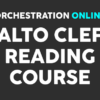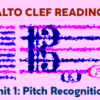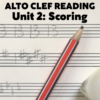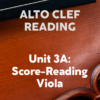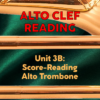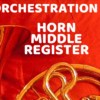This book is likely to be hanging around gathering dust in your public library. If so, go check it out, and on the way home pick up some popcorn – because after reading through the history, perspective, and interviews with these film composers, you’re going to be doing a lot of screening of classic films. The book starts with Aaron Copland and Miklos Rozsa, and goes from there up to Jerry Goldsmith and Fielding, hitting Henry Mancini and Bernard Herrmann along the way. Absolutely essential reading for getting some historical perspective.
« How Film and TV Music Communicate, Volumes 1 & 2, by Brian Morrell
Counterpoint by Walter Piston & A Treatise on Counterpoint in 40 Easy Lessons by Friedrich J. Lehmann (free from Project Gutenberg) »
Related Posts
ALTO CLEF READING COURSE ORIENTATION
Welcome to the Orchestration Online Alto Clef Reading Course, designed to quickly and permanently im
ALTO CLEF READING, UNIT 1: PITCH RECOGNITION
FINDING A USEFUL SYSTEM When I was just about 14, I switched over from the violin to viola in my jun
ALTO CLEF READING, UNIT 2: SCORING
Note: make sure to read my first tip in this course on Alto Clef concerning Pitch Recognition, downl
ALTO CLEF READING UNIT 3A: VIOLA
If you’re new to reading the alto clef, but you’ve taken the time to drill yourself on Pitch Recogni
ALTO CLEF READING UNIT 3B: ALTO TROMBONE
If this is your first look at my Alto Clef Reading Course, jump back to the my first two sections on
ALTO CLEF READING UNIT 3C: CONTRALTO VOICE
This represents the final post in my series, “Alto Clef Reading Tips and Drills.” Make sure that you
ALTO CLEF READING, UNIT 4A: 100 SIGHT-SINGING DRILLS
100 ALTO CLEF SIGHT-SINGING DRILLS By this point in my Alto Clef Reading Course, you should have sha
Orchestration Tip: Horn Middle Register
For better control in delicate scoring, use the horn’s middle register, especially in the octave bet

